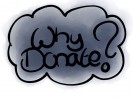Belated happy coming out day! I’d have come out as something this weekend but.. I wracked my brains and I have no idea what I have left to come out as. I’m a pretty open book at this stage. That, and the weekend was spent on roller derby- have I mentioned I’m hopelessly devoted to derby? I’d say ‘consider me an out ‘n’ proud derby fanatic’, but if you didn’t already know that, you haven’t been paying attention.
However, my having reached the bottom of my (current) barrel of things to come out as does leave me with a wealth of experience as a coming-outer, as well as someone being come out to. With that, here’s my advice for those of you on the receiving end of a coming out. Particularly for those of you who might have some out yourself, who are now listening to others come out to you.
What’s coming out?
When we hear that someone has come out, what do we think? Our first assumption- almost our automatic one- is that they have just said that they’re gay. Contrary to what popular culture would have us believe, coming out isn’t about saying you’re gay. Sometimes it might involve saying that you’re gay, of course- if gayness is the particular thing a person is coming out about that day. But gay is by no means the only, or even the primary, thing that a person might come out about. If coming out, then, isn’t about saying that you’re gay, then how can we as coming out-ees, think about it in a better way?
Here’s my definition: coming out is about revealing something about yourself in the hope of living in a more authentic fashion. It is specifically about revealing something about yourself which goes against social norms and assumptions, in the hope of living more authentically. Coming out can be a specific thing you do, or it can be a deliberate decision to live openly. The options available to you for coming out depend on where you are, what you are coming out as, and your circumstances.
Take coming out as gay, for example. If you have a similar-gendered partner or a social life involving tons of time spent in gay venues, and assuming you live somewhere that isn’t too horribly homophobic, this one’s fairly straightforward. All you have to do is talk about your life, and the assumptions that people make following from that will be correct. This doesn’t imply that it’s easy to come out or be out as gay. I live in a country where LGBTQ teachers can be legally fired if their orientation is discovered. But while it’s not easy, the process is fairly straightforward.
If we define coming out in relation to being gay, we end up making several assumptions. Assumptions like:
- Coming out is something we need to do once to each person
- Coming out, while not always received well, is generally accurately understood
- The more open you are, the more authentically you can live your life
While these assumptions generally hold true for gay people, things get a little more complicated for the rest of us. Depending on where you are in your life and what your identity is, each of these may apply to a different degree or not at all.
Take bi+* people. In most cases, the third assumption works for us. Being open as bi+, if we are able, allows us to live our lives in a more authentic fashion. It helps us to build stronger relationships, to find community, and to live life without a nagging censor at the back of our minds. When it comes to the first two assumptions, though, things start to fall apart. The second- that our coming out is generally understood- is often not the case. When bi+ people come out, we’re frequently assumed to be either lying, confused or experimenting, and depending on what part of the bi+ umbrella we’re coming out as, there can be even more inaccurate stereotypes to contend with. Because of this, the first assumption crumbles as well. We come out to people all the time, only to have them assume that our orientation changes when our circumstances do. And we come out to people all the time, only to have them assume that our orientation implies untrue or unrelated things about our behaviour- and then to assume that our orientation is invalid when they discover that we don’t meet those stereotypes.
And take trans people. Depending on circumstances, the third assumption might have the opposite effect that it does with LGB people. Being generally out as trans might allow someone to live their life more authentically, or it might mean the denial of someone’s gender once their trans status is known. Add to that widespread lack of understanding about what being trans is. Choosing whether to be out as trans and to who is a hell of a lot more complicated than being out as LGB.
That’s two of the best-known things we can come out as that aren’t lesbian or gay. If there’s that much complication there, just imagine the diversity of experiences in people coming out as something else entirely. Words like ace or poly that meet with an abject lack of comprehension half the time.
Coming out isn’t one thing. The coming out narrative can’t be defined by the experiences of cis LG people. Not anymore.
What does this mean for being come out to?
The short version of this is simple: we need to listen, and we need to let go of our ownership of other people’s coming out.
A little longer: In order to hear what is being said, we have to not listen to our assumptions around what their words mean. Remember that this person is telling you about a part of their life that they have kept hidden from you until now. By definition, you don’t know exactly what they are going to say.
And you need to believe them. It doesn’t matter if their identity was a temporary one for you or someone you know. It doesn’t even matter if it turns out to be a temporary one for them. What matters is that this is their truth, here and now. If it changes, they’ll tell you.
If someone has come out to you as something you had never heard of? Respect that. Ask if it’s okay to ask questions, or if there are places you can read more. Nobody was born knowing about the labels we use for ourselves, but it’s not tough to find resources and information these days. Don’t expect the person who came out to you to answer all of your questions. If you’re curious, show some initiative and look it up- and then you’ll be in a far better place to discuss it with them, if they want to do so. But don’t assume that coming out is carte blanche to serve as everyone’s personal wikipedia.
Listen. Don’t make assumptions. Give the person coming out to you ownership of their experiences.
Good luck!
*Bi+ (or bi-plus) is an umbrella term referring to the nonmonosexual community as a whole- people who are bisexual, biromantic, pansexual, panromantic, heteroflexible, homoflexible, nonmonosexual queer and tons of other identities.
Even bloggers have to pay the bills! Monthly subscriptions- no matter how small- help give me the security to devote time to this place and keep a roof over my head:




